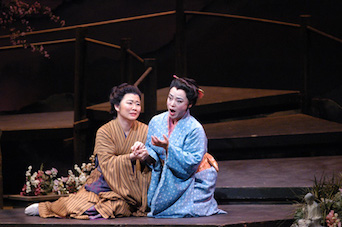
Madama Butterfly: March 23 & 24
Many of you know Dr. Glenn Winters, fondly known as “Dr. Opera,” who leads pre-performance discussions prior to Virginia Opera’s presentations here at the Center. When we asked him to share his thoughts on the company’s upcoming performance of Puccini’s masterpiece, Madama Butterfly, he shared some poignant, personal reflections on why this opera holds a special place in his heart.
Butterfly Memories: My Introduction to the Magic of Opera
Since I’m employed by an opera company, most people assume I am an opera singer. In reality, I hold three degrees in piano performance and used to concertize until arthritis ended that aspect of my career.
Like most classical pianists, my training began early. Something of a “gifted child,” much of my boyhood in Evanston, Illinois was spent on a piano bench, practicing, competing and performing. So when my seventh-grade music class began a unit on opera, I could not have been less interested. OPERA?! Chopin didn’t write any stinking operas.
I have a general memory of staring out the window a lot, paying no attention to the teacher as she outlined the plot of Puccini’s Madama Butterfly.
It will shock no one that <cough cough> I failed the exam on Butterfly. I invite you to imagine my mother’s reaction to her son, normally a good student, failing not just an exam, but a music exam. Not acceptable! Dragging me into the teacher’s office for a conference, Mom asked if anything could be done.
All this happened over a half-century ago, and sadly, I’ve long since forgotten the teacher’s name. Blessings on her, whoever she was. “If you will purchase a recording of the opera”, she said, “and if Glenn will listen to it and give me a report on it, I will let him make up the credit.”
That same afternoon my mother purchased the old London Records recording with soprano Renata Tebaldi as Cio-Cio-san, tenor Carlo Bergonzi as Pinkerton, and Tulio Serafin conducting.
You can guess the rest. Once I sat down and listened, my innate musical nature took over and I was instantly infected by the opera virus. The cascade of Puccini’s melody thrilled me. I wanted to marry Renata Tebaldi; I wanted to be Carlo Bergonzi.
But an even greater Puccini epiphany soon followed. Some months later my father had occasion to make a business trip to New York City. Well aware of my new-found crush on Puccini, he made a great gesture of dad-hood: he took me with him to the Old Metropolitan Opera house where, together, we saw Madama Butterfly in person.
The year was 1964. The cast: Renata Scotto, one of the great prima donnas of the day, as Butterfly; Barry Morell as Pinkerton and Mario Sereni as Sharpless. Our seats were in the far reaches of the upper balcony. I didn’t care. I was in heaven.
I have a few visceral memories of the performance.
In Act 1, prior to the wedding, Butterfly shows her fiancé a few personal items, including a small tin of makeup. When Pinkerton disapproves, she cries “Via!” and throws the offending container away. On this evening, Ms. Scotto threw it into an ornamental lake. This was no real lake, however, simply a portion of the stage floor painted blue with flowers bordering. The tin, rather than sinking from sight, spun around like a top for what seemed an eternity before clattering to a noisy stop and resting on the “water.” While the rest of the act continued, I found myself unable to pry my eyes from the spectacle of “the make-up that didn’t sink”.
The celebrated love duet featured a moment that still boggles my mind. As the passion of the music escalated, Ms. Scotto made an acting choice I can only describe as odd. She and Mr. Morell had been posted at the rear of the stage near the house. Suddenly, Scotto left him by himself, slowly strode downstage center, opened her arms wide as if embracing all of us in the audience, and sang – to us!
Pinkerton was left to fend for himself. I was only twelve, but even I knew this was not how a love duet should go.
My final memory is of the curtain calls. I had never seen anything like them. Oh reader, do not compare them to any curtain calls you have seen at Mason after a Virginia Opera production. Ms. Scotto’s adoring fans brought her out again… and again… and again, until the spectacle of ten, fourteen, twenty, even thirty curtain calls – or more; I lost count – became a surreal phenomenon. I stared in morbid fascination. Did the artist actually enjoy this adulation? Why did it go on so long? What was it for? Was she trying for some kind of record? Trying to get one more bow than Callas or Price?
None of these idiosyncrasies, I assure you, spoiled the magic of that evening or dimmed my love of Puccini’s masterwork. If any of you who read this essay will be seeing Madama Butterfly for the first time, please know that I envy you. Know also that my hope for you is that Puccini’s magic will cast the same spell on you that, fifty-four years ago, it cast on a skinny pre-adolescent piano student named Glenn Winters.
Virginia Opera
Madama Butterfly
Saturday, March 23 at 8 p.m. and Sunday, March 24 at 2 p.m.
Tickets start at $54.
